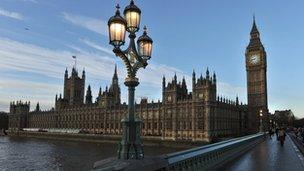Special clause to give Holyrood right to run referendum
- Published

Westminster could use a special clause allowing Holyrood to run the referendum
Westminster could hand Holyrood the legal power to run a Scottish independence referendum, the BBC has learned.
It is one scenario being considered as the House of Lords prepares to scrutinise a bill to give the Scottish Parliament more power.
The SNP government has pledged to hold a referendum in the second half of its parliamentary term.
But a debate has focused on who should be allowed to call it.
First Minister Alex Salmond said the majority Scottish government had won the right to stage the referendum following its landslide election victory in May.
His comments have been previously echoed by Scottish Secretary Michael Moore.
Whitehall sources have confirmed they are discussing the possibility of using a special clause in the Scotland Act which would allow Holyrood to run the poll.
A provision in the existing devolution legislation, which is known as a Section 30 order, allows for powers normally reserved to Westminster to be given to Holyrood.
The decision on whether the measure could be called upon would depend on legal advice, and is also likely to contain a stipulation that any referendum would have to be held by a specific date.
The Scotland Bill, external, currently going through Westminster, would give Holyrood increased financial powers, as well as control over drink-drive and speeding laws as well as airgun legislation.
A special Holyrood committee set up to look at the bill said earlier this month it was "unable to recommend" that MSPs supported the legislation, describing it as "not yet fit for purpose".
The SNP majority, with Green support, said it wanted the Scotland Bill to include the devolution of full tax powers, plus welfare and benefits.
Mr Moore previously declined to explicitly rule out any UK involvement in the forthcoming independence referendum when he appeared before the committee.
He said the coalition was "not intending" to bring forward a clarity clause in Westminster legislation to set out the terms for the referendum.
But he insisted the the point was "hypothetical" and recognised the SNP's right to run the independence vote.
Lord Forsyth, a former Tory secretary of state for Scotland, welcomed the possibility of a legally binding referendum being held in Scotland.
He told BBC Radio Scotland's Good Morning Scotland programme: "Who actually runs it is irrelevant.
"What matters is that we have a properly conducted campaign, that we have it properly supervised by the Electoral Commission, and that the result is binding, so that if people vote for independence that is exactly what will happen, and that we end this uncertainty which is so damaging to Scotland's financial interests as soon as possible."
The issue emerged the day after Britain's most senior civil servant, Cabinet Secretary Sir Gus O'Donnell, warned just before his retirement that holding the United Kingdom together would be an "enormous challenge".
Mr Salmond, said: "The Scottish government won the right in this year's Scottish election to hold the referendum in the second half of the parliament - Lord Forsyth lost the right to run Scotland in 1997, when he lost every single Tory seat in Scotland.
"The Westminster parties - whose ability to meet the challenge on the constitution was questioned only yesterday by the UK Cabinet Secretary - will just have to wake up to the fact that times have changed, and that nowadays decisions on the future of Scotland will be taken in Scotland, according to the wishes of the people and the parliament."
A Scotland Office spokesman, said: "The Scotland Bill will return to the Lords in January where these issues will be discussed in detail.
"It illustrates that the Scottish Government must end the considerable uncertainty the prospect of a referendum is causing by bringing forward its detailed plans as soon as possible."
- Published22 December 2011
- Published15 December 2011
- Published5 November 2011
- Published1 November 2011
- Published25 October 2011
- Published23 October 2011
- Published22 October 2011
- Published13 September 2011
- Published8 September 2011
- Published7 September 2011